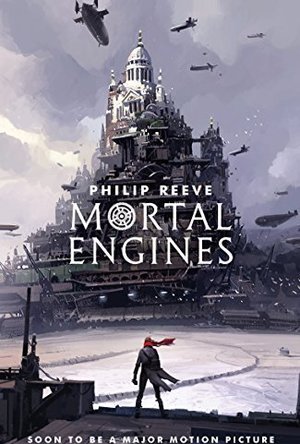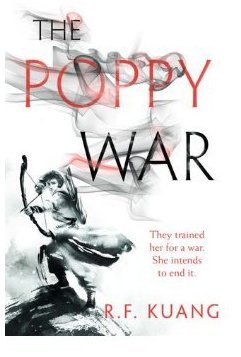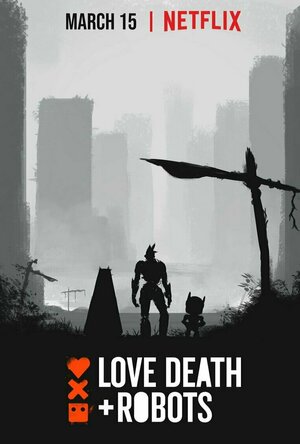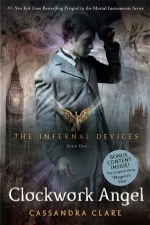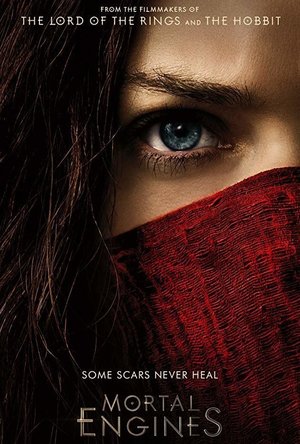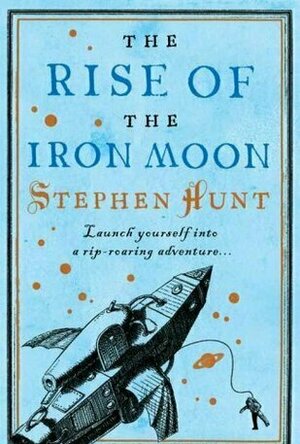Search
Goddess in the Stacks (553 KP) rated Mortal Engines (The Hungry City Chronicles, #1) in Books
Dec 25, 2018
Through this entire book, I kept thinking "this feels like Valerian and the City of a Thousand Planets." It's a completely different setting, and a different plot, but it had the same atmosphere. Rollicking action, fantastical premise, crazy setting, huge machines with entire worlds within them. I loved Valerian - it may not have been a critically great movie, and I don't think the leads had much chemistry, but the movie was just FUN. And that's how Mortal Engines is, too.
It's a crazy world, where cities have become mobile - think Howl's Moving Castle - and they chase each other across a barren world, devouring each other for resources in a social order they call Municipal Darwinism. Some cities, like London, are huge, with six main levels, not really counting the Gut, or the center of the machinery. Other towns are small, one or two levels crawling along trying to avoid the notice of the larger, faster cities. The peoples of the Traction Cities think people who live in statics (stationary cities, or, horror of horrors, right on the ground!) or people who are part of the Anti-Traction League, are crazy barbarians. And then there are the airship captains and crews, based out of the one floating city.
It is a crazy steampunk world, and Tom Natsworthy stumbles into a conspiracy plot by being in the wrong place at the wrong time. But as he travels with Hester across the wasteland, trying to survive their pursuers and avert catastrophe, he learns more about her, and more about how the world actually works.
I absolutely adore the last two sentences of the book, and I'm going to post those here because they aren't terribly spoilery. And they're fantastic.
"You aren't a hero, and I'm not beautiful, and we probably won't live happily ever after," she said. "But we're alive, and together, and we're going to be all right."
This book is the first of a quartet, and Reeve also wrote a prequel trilogy, so there's actually three books before AND after this book. I'll probably check my library for them, because I REALLY enjoyed this book.
You can find all my reviews at http://goddessinthestacks.com
It's a crazy world, where cities have become mobile - think Howl's Moving Castle - and they chase each other across a barren world, devouring each other for resources in a social order they call Municipal Darwinism. Some cities, like London, are huge, with six main levels, not really counting the Gut, or the center of the machinery. Other towns are small, one or two levels crawling along trying to avoid the notice of the larger, faster cities. The peoples of the Traction Cities think people who live in statics (stationary cities, or, horror of horrors, right on the ground!) or people who are part of the Anti-Traction League, are crazy barbarians. And then there are the airship captains and crews, based out of the one floating city.
It is a crazy steampunk world, and Tom Natsworthy stumbles into a conspiracy plot by being in the wrong place at the wrong time. But as he travels with Hester across the wasteland, trying to survive their pursuers and avert catastrophe, he learns more about her, and more about how the world actually works.
I absolutely adore the last two sentences of the book, and I'm going to post those here because they aren't terribly spoilery. And they're fantastic.
"You aren't a hero, and I'm not beautiful, and we probably won't live happily ever after," she said. "But we're alive, and together, and we're going to be all right."
This book is the first of a quartet, and Reeve also wrote a prequel trilogy, so there's actually three books before AND after this book. I'll probably check my library for them, because I REALLY enjoyed this book.
You can find all my reviews at http://goddessinthestacks.com
Gareth von Kallenbach (980 KP) rated Jonah Hex (2010) in Movies
Aug 8, 2019
DC is at it again spinning comic book heroes, or better yet anti-heroes, into film adaptations. Moreover, the company is maintaining their one-of-a-kind knack for providing lead characters with bad vocals. In this case the raspy voice belongs to the traumatized lead character, a Bounty Hunter named Jonah Hex (Josh Brolin), who has a story to tell, in brutal and confusing detail.
The film mixes the lore of the Old West, vaguely historical aspects of post-Civil War America, and weapons from a very steampunk-the-Industrial-Revolution. The resulting environment is more explosive than the dynamite that is apparently everywhere.
Filled with ideas that trail off into the dust, it quickly becomes clear that this film was finished in a rush. There are too many characters that lack compelling, if any, back-story. The tale that remains is disjointed and drags. All the buzz about the leading lady, Lilah (Megan Fox), was over minimal participation in the film. Sure she looks nice, and wears a steampunky outfit while performing a few quick stunts, but the resulting character (and poor acting) is not worth the media hype.
The few well-played and interesting characters, aside from the brash but tends-to-grow-on-you Jonah, all have bit parts. Among the best performances are Hex’s best friend, Jeb Turnbull (Jeffery Dean Morgan), one of President Grant’s cohorts, Lieutenant Grass (Will Arnett), and the store owner and gun-runner, Smith (Lance Riddick). Most surprising is that the frequent scenes with screen veteran John Malkovich, as lead bad guy Quentin Turnbull, result in a drab uninterested character that completely fails to engage the audience. It is almost a shockingly poor performance for Malkovich.
But hey, the melding of comic book history with actual film shots in the beginning was some of the best work out there for explaining a complex and multi-media adapted back-story. Additionally, the bold uses of color, costume, sets and scenery made the film visually interesting to watch. But with a budget as big as this film had it is hard to accept there wasn’t a better story to tell.
The film mixes the lore of the Old West, vaguely historical aspects of post-Civil War America, and weapons from a very steampunk-the-Industrial-Revolution. The resulting environment is more explosive than the dynamite that is apparently everywhere.
Filled with ideas that trail off into the dust, it quickly becomes clear that this film was finished in a rush. There are too many characters that lack compelling, if any, back-story. The tale that remains is disjointed and drags. All the buzz about the leading lady, Lilah (Megan Fox), was over minimal participation in the film. Sure she looks nice, and wears a steampunky outfit while performing a few quick stunts, but the resulting character (and poor acting) is not worth the media hype.
The few well-played and interesting characters, aside from the brash but tends-to-grow-on-you Jonah, all have bit parts. Among the best performances are Hex’s best friend, Jeb Turnbull (Jeffery Dean Morgan), one of President Grant’s cohorts, Lieutenant Grass (Will Arnett), and the store owner and gun-runner, Smith (Lance Riddick). Most surprising is that the frequent scenes with screen veteran John Malkovich, as lead bad guy Quentin Turnbull, result in a drab uninterested character that completely fails to engage the audience. It is almost a shockingly poor performance for Malkovich.
But hey, the melding of comic book history with actual film shots in the beginning was some of the best work out there for explaining a complex and multi-media adapted back-story. Additionally, the bold uses of color, costume, sets and scenery made the film visually interesting to watch. But with a budget as big as this film had it is hard to accept there wasn’t a better story to tell.
Goddess in the Stacks (553 KP) rated The Poppy War (The Poppy War #1) in Books
Oct 9, 2018
Have you ever read a book that is so good you don't know what to say about it? It's taken me almost two weeks to even attempt this review because I just don't know what to write. The Poppy War is your typical story of downtrodden, disadvantaged girl testing into the highest school in the land and gaining the opportunities and privileges that come with that, but then the book takes a sharp twist into war. Rin doesn't exactly get the most typical of educations, even before war breaks out. And when war breaks out, the school is disbanded, the students getting flung all over the land to where the government thinks they will help the most. For Rin, that's joining The Cike. The Bizarre Children. The division of people who can do....things. Things the rest of the military isn't comfortable with. The Cike can call on the powers of gods, and doing so makes them not-quite-untouchables. Rin, who was never short on resentment before this, grows ever more resentful.
Rin is an interesting character; she's been hard done by, yes, but she makes decisions that only make things harder on herself. So I feel for her a little, but at the same time, girl. Check yourself. What's been done to you doesn't justify what you plan to do to others. I am hoping she comes to see that in the next book, because her rage and need for vengeance definitely gets the best of her in this one.
The Poppy War is an excellently written blend of military fantasy, epic fantasy, and coming-of-age novel. Unlike some books, where the military aspect far overshadows the characters, leaving them flat, Poppy War doesn't ignore the characters to focus on the bigger picture. It's a very good mix of both close-up focus on characters, fights, battles, and zoomed-out strategy and war. It's probably the best military fantasy I've read, and the Asian aspect of it makes it even better. So much military fantasy is western European, or Steampunk, or both. I've been finding more and more Asian and African fantasy, and I am SO HERE FOR IT. I need to try to find more South American fantasy. I know it's out there.
I will definitely be watching for the next book in this series, because it's awesome.
You can find all my reviews at http://goddessinthestacks.com
Rin is an interesting character; she's been hard done by, yes, but she makes decisions that only make things harder on herself. So I feel for her a little, but at the same time, girl. Check yourself. What's been done to you doesn't justify what you plan to do to others. I am hoping she comes to see that in the next book, because her rage and need for vengeance definitely gets the best of her in this one.
The Poppy War is an excellently written blend of military fantasy, epic fantasy, and coming-of-age novel. Unlike some books, where the military aspect far overshadows the characters, leaving them flat, Poppy War doesn't ignore the characters to focus on the bigger picture. It's a very good mix of both close-up focus on characters, fights, battles, and zoomed-out strategy and war. It's probably the best military fantasy I've read, and the Asian aspect of it makes it even better. So much military fantasy is western European, or Steampunk, or both. I've been finding more and more Asian and African fantasy, and I am SO HERE FOR IT. I need to try to find more South American fantasy. I know it's out there.
I will definitely be watching for the next book in this series, because it's awesome.
You can find all my reviews at http://goddessinthestacks.com
LeftSideCut (3776 KP) rated Love, Death & Robots - Season 1 in TV
Apr 9, 2020
The beauty of Love, Death and Robots is it's format. An eclectic collection of animated short films, some genuinely brilliant, with a handful of duds, truly gives something for everyone.
There are 18 films on show here, all with something different to offer.
Firstly there were 3 that failed to really resonate with me - Sucker of Souls, When the Yoghurt Took Over, and Alternate Histories. I found these three either slightly boring, or silly for the sake of being silly. There were 2 that sort of floated in the middle - The Dump, and Blind Spot, not bad by any means (none of the shorts are truly bad) but just were sort of there.
Leaving a grand total of 13 shorts that I thought were really really great.
A handful of these realistic CGI entries - namely, Sonnie's Edge, Three Robots, Beyond the Aquila Rift, Shape Shifters (one of the highlights for me), Helping Hand (reminded me of Gravity, in a great way), Lucky 13, and The Secret War.
These lot are lengthier offerings, and boast some good looking CGI animation, bordering on photo realism at times. The run time gives an opportunity for some decent fleshed out stories.
The Secret War in particular is nothing short of breath taking, and may well be my top pick of the whole season.
Elsewhere, we have more cartoony offerings - Suits, a loud animation that features farmers in mech suits fighting aliens. Zima Blue, a beautifully touching story of how a simple robot transcends existence itself - another highlight of the season. Fish Night, a short desert based drama bursting with colour. The animation of this one reminded me of A Scanner Darkly. Good Hunting, a collision of Ancient Chinese stories and a Bioshock style steampunk future. Hard to watch at times, but stunning also - easily would have been my top pick if The Secret War wasn't included.
Rounding it off we have The Witness, and animation that looks like a moving oil painting and reminded me of Mirror's Edge, and Ice Age, a fun short that's the only live action inclusion with CGI flourishes about a civilisation growing in a couple freezer.
It's an ambitious collection of shorts for sure, but like I said, there's something here for everyone. Even the ones that I liked the least are a 6/10 at worst. If you like sci-fi or animation in any shape or form, then check this series out.
There are 18 films on show here, all with something different to offer.
Firstly there were 3 that failed to really resonate with me - Sucker of Souls, When the Yoghurt Took Over, and Alternate Histories. I found these three either slightly boring, or silly for the sake of being silly. There were 2 that sort of floated in the middle - The Dump, and Blind Spot, not bad by any means (none of the shorts are truly bad) but just were sort of there.
Leaving a grand total of 13 shorts that I thought were really really great.
A handful of these realistic CGI entries - namely, Sonnie's Edge, Three Robots, Beyond the Aquila Rift, Shape Shifters (one of the highlights for me), Helping Hand (reminded me of Gravity, in a great way), Lucky 13, and The Secret War.
These lot are lengthier offerings, and boast some good looking CGI animation, bordering on photo realism at times. The run time gives an opportunity for some decent fleshed out stories.
The Secret War in particular is nothing short of breath taking, and may well be my top pick of the whole season.
Elsewhere, we have more cartoony offerings - Suits, a loud animation that features farmers in mech suits fighting aliens. Zima Blue, a beautifully touching story of how a simple robot transcends existence itself - another highlight of the season. Fish Night, a short desert based drama bursting with colour. The animation of this one reminded me of A Scanner Darkly. Good Hunting, a collision of Ancient Chinese stories and a Bioshock style steampunk future. Hard to watch at times, but stunning also - easily would have been my top pick if The Secret War wasn't included.
Rounding it off we have The Witness, and animation that looks like a moving oil painting and reminded me of Mirror's Edge, and Ice Age, a fun short that's the only live action inclusion with CGI flourishes about a civilisation growing in a couple freezer.
It's an ambitious collection of shorts for sure, but like I said, there's something here for everyone. Even the ones that I liked the least are a 6/10 at worst. If you like sci-fi or animation in any shape or form, then check this series out.
Kyera (8 KP) rated Clockwork Angel in Books
Jan 31, 2018
Clockwork Angel is the first book in the Infernal Devices trilogy by Cassandra Clare. It is set in Victorian London and has an air of steampunk – although it is not explicitly that genre. There are clockwork creations and automatons, a Shadowhunter inventor that tinkers with gears and wires, but the overall setting is not one of steam powered air machines and gear-covered outfits. As a fan of the steampunk genre and aesthetic, I quite enjoyed the subtle notes of it in this series.
The clockwork automatons are intriguing, as they are made from neither Heaven nor Hell and thus the Shadowhunters have no experience dealing with them. They create a unique foe to fight against and are a greater mystery – as our heroes do not know who truly created them, or their nefarious purpose.
Each chapter is headed with an excerpt from a poem that Tessa might have found herself reading over the years. Each is not only a wonderful addition to the story but if you enjoy them, perhaps it will lead you to seek them out in their original forms. I personally do not find myself frequently reading poetry, but the first time I read this book I fell in love with the poems selected. It caused me to go in search of them and read poetry. Perhaps you too will find yourself inspired.
As with the Mortal Instruments, our main character is a female who is unfamiliar with the Shadow World at the beginning of the novel. Before long, she is completely embroiled in the world, the politics and must learn as she goes. In this novel, our heroine is given the Shadowhunter Codex to read which allows her to quickly understand the roles of the Shadowhunter and the world she didn’t even know existed. I have always liked Tessa and felt a kinship to her, as we are very similar.
Tessa is quite tall, especially for a woman in the Victorian era, brunette and loves books more than anything else (other than perhaps her family.) Her Aunt was a very learned woman, so Tessa received a decent education and fostered a love of reading. She is able to quote from books that she loves and does not discriminate between books considered high-brow and those considered for the lower class of society. Tessa is very intelligent and not afraid to voice her opinions, even though it was not widely accepted at that time for women to be sharp of tongue. She also does not like chocolate, which endeared her to me immediately as I also am one of the few people it seems who does not like chocolate.
Our two male leads are Jem and Will, who are parabatai but quite dissimilar from one another. Jem was originally from the Shanghai Institute but found himself in the London Institute when his parents were murdered by demons. He is quiet, kind, intelligent and loves Will like a brother. Will is a Herondale, with all of the charm that comes with it. He is more reckless, boasts about frequenting brothels and dens of vice, and despite his outward attempts to appear cheerful is prone to melancholy.
The Institute is filled with other Shadowhunters and servants with vastly different personalities who bring a lot of interesting storylines with them. Charlotte and Henry are the heads of the Institute, despite their young age. Henry is a brilliant inventor, although a bit scatterbrained. Jessamine was forced to live in the Institute after the death of her parents, but she has never desired to be a Shadowhunter.
The first book introduces us to the Shadow World of London, as Tessa is invited to travel from New York to London to live with her brother. Her plans do not turn out as she had expected and it leads her on an adventure with the Nephilim. It is fascinating to see how different the Shadowhunters of this era are, and yet utterly the same. It was also interesting to see how the Shadowhunters view the Downworld. While it was not entirely equal to the time of the Mortal Instruments series, you realize that is has improved in the century since the Infernal Devices and must be leagues above the treatment in the earliest years of the Nephilim.
Whether Clockwork Angel is your first foray into the Shadow World, or not, it is a highly entertaining and well-written novel that I could not recommend more. Many people feel that this series is the best of the three, so if you’ve been considering reading any of the Shadowhunter Chronicles but were not quite sure – perhaps this is a good place to start. I personally would recommend reading a number of the Mortal Instruments before beginning this series, but that is just my opinion. Either way, if you have not yet read this book – please go do so now! It is one of my favourites and I hope that it will be yours as well.
The clockwork automatons are intriguing, as they are made from neither Heaven nor Hell and thus the Shadowhunters have no experience dealing with them. They create a unique foe to fight against and are a greater mystery – as our heroes do not know who truly created them, or their nefarious purpose.
Each chapter is headed with an excerpt from a poem that Tessa might have found herself reading over the years. Each is not only a wonderful addition to the story but if you enjoy them, perhaps it will lead you to seek them out in their original forms. I personally do not find myself frequently reading poetry, but the first time I read this book I fell in love with the poems selected. It caused me to go in search of them and read poetry. Perhaps you too will find yourself inspired.
As with the Mortal Instruments, our main character is a female who is unfamiliar with the Shadow World at the beginning of the novel. Before long, she is completely embroiled in the world, the politics and must learn as she goes. In this novel, our heroine is given the Shadowhunter Codex to read which allows her to quickly understand the roles of the Shadowhunter and the world she didn’t even know existed. I have always liked Tessa and felt a kinship to her, as we are very similar.
Tessa is quite tall, especially for a woman in the Victorian era, brunette and loves books more than anything else (other than perhaps her family.) Her Aunt was a very learned woman, so Tessa received a decent education and fostered a love of reading. She is able to quote from books that she loves and does not discriminate between books considered high-brow and those considered for the lower class of society. Tessa is very intelligent and not afraid to voice her opinions, even though it was not widely accepted at that time for women to be sharp of tongue. She also does not like chocolate, which endeared her to me immediately as I also am one of the few people it seems who does not like chocolate.
Our two male leads are Jem and Will, who are parabatai but quite dissimilar from one another. Jem was originally from the Shanghai Institute but found himself in the London Institute when his parents were murdered by demons. He is quiet, kind, intelligent and loves Will like a brother. Will is a Herondale, with all of the charm that comes with it. He is more reckless, boasts about frequenting brothels and dens of vice, and despite his outward attempts to appear cheerful is prone to melancholy.
The Institute is filled with other Shadowhunters and servants with vastly different personalities who bring a lot of interesting storylines with them. Charlotte and Henry are the heads of the Institute, despite their young age. Henry is a brilliant inventor, although a bit scatterbrained. Jessamine was forced to live in the Institute after the death of her parents, but she has never desired to be a Shadowhunter.
The first book introduces us to the Shadow World of London, as Tessa is invited to travel from New York to London to live with her brother. Her plans do not turn out as she had expected and it leads her on an adventure with the Nephilim. It is fascinating to see how different the Shadowhunters of this era are, and yet utterly the same. It was also interesting to see how the Shadowhunters view the Downworld. While it was not entirely equal to the time of the Mortal Instruments series, you realize that is has improved in the century since the Infernal Devices and must be leagues above the treatment in the earliest years of the Nephilim.
Whether Clockwork Angel is your first foray into the Shadow World, or not, it is a highly entertaining and well-written novel that I could not recommend more. Many people feel that this series is the best of the three, so if you’ve been considering reading any of the Shadowhunter Chronicles but were not quite sure – perhaps this is a good place to start. I personally would recommend reading a number of the Mortal Instruments before beginning this series, but that is just my opinion. Either way, if you have not yet read this book – please go do so now! It is one of my favourites and I hope that it will be yours as well.
Gareth von Kallenbach (980 KP) rated Mortal Engines (2018) in Movies
Jul 2, 2019
Take a moment and imagine a world where most of humanity has been wiped off the map and those that remain are forced to survive on the remaining resources of a civilization that has been torn apart. In this new existence, leftover technology is coveted like diamonds and massive predator cities prey on weaker smaller cities to steal whatever meager resources they still possess. This is the world of Mortal Engines, the latest Peter Jackson blockbuster based on the young adult novel of the same name by Philip Reeves.
Mortal Engines takes place roughly a thousand years after the conclusion of the Sixty Minute War that decimated the earth and now civilization has banded into two very distinct groups. There are those in the “Traction Cities”, which are behemoth mobile cities that scour what remains of Europe gobbling up smaller cities to convert them and their resources into fuel that keeps the larger cities moving. Then there is the Anti-Traction League, a group that believes in preserving what little resources remain and living in “Traction-less” cities…a.k.a. cities built on land. London is the main Traction City and it is led by Thaddeus Valentine (Hugo Weaving) and his desire to tear down a great wall that is the only barrier between London and the surplus of resources that he so desperately needs.
After London devours one of the smaller cities, we are introduced to Hester Shaw (Hera Hilmar), whose one goal in life is to kill Thaddeus Valentine, the man who murdered her mother. After her failed assassination attempt on his life, she teams up with historian Tom Natsworthy (Robert Sheehan) to not only survive, but also to prevent Valentine’s plan to recreate the war that took down humanity in the first place. This is a big job for the unlikely duo and on top of everything else, Hester is being hunted by a zombie/terminator hybrid named Shrike who wants nothing more than to kill her.
If it sounds like a lot to follow over the course of the two hours and nine-minute run time, you’d be right. In fact, without a lot of backstory which those who have read the novels will really benefit from, it can be a bit too much to take in. It comes across as a combination of Mad Max and the video game Dishonored, but it is lacking an excellent story to back up all of the post-apocalyptic action. That’s not to say that the story is bad, but it is by far the weakest part of the film and a huge missed opportunity to elevate a pretty good movie to the classic Peter Jackson masterpiece status we usually get from him. Considering the genius of Mr. Jackson this movie could have been so much more.
But now on to the good stuff…
Visually speaking Mortal Engines is a true work of art. Taking the steampunk Victorian era backdrop and adding in large mobile cities crashing through trees and forests gives us visuals that are not only magnificent, but also awe inspiring. I was lucky enough to see Mortal Engines in IMAX and the larger screen only helped to emphasize how truly awesome these large rolling cities are. This is a movie that is meant to be seen on the big screen, and with Mortal Engines, the bigger the better. The sound design matches the visuals in its epic scale, as it is loud and menacing. You can actually feel the rumble of the large treads as they move across the earth, and the crunching of smaller cities as the massive cities devour all that crosses their path. The casting and the acting were another positive as the good characters were ones you wanted to root for and the bad characters you hope would get what’s coming to them. All in all, there is quite a bit to like in this film and if nothing else you are sure to have a good time taking in all of the scenery.
In summary, Mortal Engines is a movie that feels as though it had so much potential but couldn’t quite live up to it. It definitely feels more like a summer blockbuster, full of explosions and action, instead of the deeper holiday releases that we usually get around this time. It’s the kind of movie that you go to see for the sheer spectacle of it all as long as you are willing to overlook any plot or story depth. Unfortunately, this leaves the quandary of whether or not it’s worth the full price of admission (or even more if you are planning to see it in IMAX) and my answer to that is…it depends. If you have any interest in seeing it at all then Mortal Engines is definitely a movie you should see on the big screen. On the other hand, it might be worth it to just wait to see it on pay-per-view or Blu-ray even though it may lose a lot of what makes the movie so much fun in the first place. While the movie could have been better, I have definitely seen worse and if the idea of massive rolling cities and steampunk set pieces are your thing, then Mortal Engines is certainly worth a look.
Mortal Engines takes place roughly a thousand years after the conclusion of the Sixty Minute War that decimated the earth and now civilization has banded into two very distinct groups. There are those in the “Traction Cities”, which are behemoth mobile cities that scour what remains of Europe gobbling up smaller cities to convert them and their resources into fuel that keeps the larger cities moving. Then there is the Anti-Traction League, a group that believes in preserving what little resources remain and living in “Traction-less” cities…a.k.a. cities built on land. London is the main Traction City and it is led by Thaddeus Valentine (Hugo Weaving) and his desire to tear down a great wall that is the only barrier between London and the surplus of resources that he so desperately needs.
After London devours one of the smaller cities, we are introduced to Hester Shaw (Hera Hilmar), whose one goal in life is to kill Thaddeus Valentine, the man who murdered her mother. After her failed assassination attempt on his life, she teams up with historian Tom Natsworthy (Robert Sheehan) to not only survive, but also to prevent Valentine’s plan to recreate the war that took down humanity in the first place. This is a big job for the unlikely duo and on top of everything else, Hester is being hunted by a zombie/terminator hybrid named Shrike who wants nothing more than to kill her.
If it sounds like a lot to follow over the course of the two hours and nine-minute run time, you’d be right. In fact, without a lot of backstory which those who have read the novels will really benefit from, it can be a bit too much to take in. It comes across as a combination of Mad Max and the video game Dishonored, but it is lacking an excellent story to back up all of the post-apocalyptic action. That’s not to say that the story is bad, but it is by far the weakest part of the film and a huge missed opportunity to elevate a pretty good movie to the classic Peter Jackson masterpiece status we usually get from him. Considering the genius of Mr. Jackson this movie could have been so much more.
But now on to the good stuff…
Visually speaking Mortal Engines is a true work of art. Taking the steampunk Victorian era backdrop and adding in large mobile cities crashing through trees and forests gives us visuals that are not only magnificent, but also awe inspiring. I was lucky enough to see Mortal Engines in IMAX and the larger screen only helped to emphasize how truly awesome these large rolling cities are. This is a movie that is meant to be seen on the big screen, and with Mortal Engines, the bigger the better. The sound design matches the visuals in its epic scale, as it is loud and menacing. You can actually feel the rumble of the large treads as they move across the earth, and the crunching of smaller cities as the massive cities devour all that crosses their path. The casting and the acting were another positive as the good characters were ones you wanted to root for and the bad characters you hope would get what’s coming to them. All in all, there is quite a bit to like in this film and if nothing else you are sure to have a good time taking in all of the scenery.
In summary, Mortal Engines is a movie that feels as though it had so much potential but couldn’t quite live up to it. It definitely feels more like a summer blockbuster, full of explosions and action, instead of the deeper holiday releases that we usually get around this time. It’s the kind of movie that you go to see for the sheer spectacle of it all as long as you are willing to overlook any plot or story depth. Unfortunately, this leaves the quandary of whether or not it’s worth the full price of admission (or even more if you are planning to see it in IMAX) and my answer to that is…it depends. If you have any interest in seeing it at all then Mortal Engines is definitely a movie you should see on the big screen. On the other hand, it might be worth it to just wait to see it on pay-per-view or Blu-ray even though it may lose a lot of what makes the movie so much fun in the first place. While the movie could have been better, I have definitely seen worse and if the idea of massive rolling cities and steampunk set pieces are your thing, then Mortal Engines is certainly worth a look.
Hazel (1853 KP) rated A City Dreaming in Books
Dec 14, 2018
My rating: 2.5
<i>I received this book for free through Goodreads First Reads.</i>
“The city never sleeps, but it’s always dreaming.” And, by dreaming, Daniel Polansky clearly means nightmares. <i>A City Dreaming</i> is, for the lack of a better term, an urban fantasy novel. Embracing elements of dystopia and steampunk universes, it is difficult to determine the time period in which it is set. What can be established is that, wherever you are in the world, you are never far away from a monster.
<i>A City Dreaming</i> revolves around a semi-anonymous character known as M. M appears to be some form of magician who wishes he could spend his days listlessly staring into the bottom of his beer glass. Yet with misbehaving creatures and warring goddess living in the city of New York, peace is a rare phenomenon in M’s life. From demons to murders and mind-boggling situations, there is never a dull moment.
Each chapter of <i>A City Dreaming</i> is, in some way, an individual story. Apart from the occasional recurring character, no scenario is ever continued after the chapter concludes. This is initially a cause for confusion. With no clear direction or purpose, it is hard to remain engaged with the author’s imagination.
Readers familiar with contemporary fantasy writers, such as Neil Gaiman, may understand Polansky’s vision – think <i>Neverwhere</i> and <i>American Gods</i> combined, but weirder. M spends the majority of his time either inebriated or on drugs, and, to be frank, it would not be surprising to learn the author was on drugs at the time of writing. Imagine Neil Gaiman on drugs; that is how bizarre this book is.
Despite his penchant for recreational drugs, M is an intelligent character that can humorously talk himself out of impossible situations. However it is often a hopeless ordeal to fathom the process of his intoxicated mind. As a result, <i>A City Dreaming</i> loses its thrill and excitement.
As this is the first Daniel Polansky novel that I have read, I do not know whether this is his usual style of writing or whether it was an attempt at something new. What I did observe was the intelligence hidden behind the excess of expletives and lewd content. Polansky writes with certain aptitude, almost as if he has swallowed a thesaurus.
Fans of Neil Gaiman and Brandon Sanderson may enjoy <i>A City Dreaming</i> more than new readers, since they will already be familiar with the style of bemusing narration. <i>A City Dreaming</i> does not live up to the definition of a novel, however as short, connecting stories it provides the intended entertainment. Almost certainly, this book will be received with mixed reviews; nonetheless it will undoubtedly eventually find its fan base.
<i>I received this book for free through Goodreads First Reads.</i>
“The city never sleeps, but it’s always dreaming.” And, by dreaming, Daniel Polansky clearly means nightmares. <i>A City Dreaming</i> is, for the lack of a better term, an urban fantasy novel. Embracing elements of dystopia and steampunk universes, it is difficult to determine the time period in which it is set. What can be established is that, wherever you are in the world, you are never far away from a monster.
<i>A City Dreaming</i> revolves around a semi-anonymous character known as M. M appears to be some form of magician who wishes he could spend his days listlessly staring into the bottom of his beer glass. Yet with misbehaving creatures and warring goddess living in the city of New York, peace is a rare phenomenon in M’s life. From demons to murders and mind-boggling situations, there is never a dull moment.
Each chapter of <i>A City Dreaming</i> is, in some way, an individual story. Apart from the occasional recurring character, no scenario is ever continued after the chapter concludes. This is initially a cause for confusion. With no clear direction or purpose, it is hard to remain engaged with the author’s imagination.
Readers familiar with contemporary fantasy writers, such as Neil Gaiman, may understand Polansky’s vision – think <i>Neverwhere</i> and <i>American Gods</i> combined, but weirder. M spends the majority of his time either inebriated or on drugs, and, to be frank, it would not be surprising to learn the author was on drugs at the time of writing. Imagine Neil Gaiman on drugs; that is how bizarre this book is.
Despite his penchant for recreational drugs, M is an intelligent character that can humorously talk himself out of impossible situations. However it is often a hopeless ordeal to fathom the process of his intoxicated mind. As a result, <i>A City Dreaming</i> loses its thrill and excitement.
As this is the first Daniel Polansky novel that I have read, I do not know whether this is his usual style of writing or whether it was an attempt at something new. What I did observe was the intelligence hidden behind the excess of expletives and lewd content. Polansky writes with certain aptitude, almost as if he has swallowed a thesaurus.
Fans of Neil Gaiman and Brandon Sanderson may enjoy <i>A City Dreaming</i> more than new readers, since they will already be familiar with the style of bemusing narration. <i>A City Dreaming</i> does not live up to the definition of a novel, however as short, connecting stories it provides the intended entertainment. Almost certainly, this book will be received with mixed reviews; nonetheless it will undoubtedly eventually find its fan base.
Phil Leader (619 KP) rated The Rise of the Iron Moon (Jackelian #3) in Books
Nov 25, 2019
This book looked interesting so I picked it up. I'd not heard of Stephen Hunt or this series but the premise intrigued me.
Although this is the third book of the series and there are plenty of references to events that must take place in the previous books, and despite the writing being immersive rather than explanatory, I found it easy to get into the story.
The world is very interesting. I have read other novels set in a faux Victorian Steampunk-like world but nothing like this. This is like an alternative history, extremely divergeant from ours but with enough similarities that the combination is quite striking.
For example there was a civil war in the past which parliament won, as in the 'real' British history. However all of the royals have been locked up ever since in the Royal Breeding House - kept as figureheads under constant house arrest and threat of execution at the whim of parliament to appease the masses.
There are also countries ruled by thinking, steam driven machines. Others beneath the waves or living strictly by some political principal.
However the world is under threat. All the countries are being slowly invaded from the North by a very aggressive foe. Under attack the land of Jackals itself calls on its heroes to save the day. Purity Blake, one of the inmates of the Royal Breeding House. Molly Templar, writer of penny dreadful science fiction stories and sometimes defender of the land. Coppertracks, a machine life steam man and scientist. Their companions must overcome impossible odds and put aside the enmity between nations to fight off the attackers. Against all the odds, can they succeed?
The book is a little slow to start up, as the characters are introduced in their diverse environments. But slowly the threads are drawn together and each play their part in the fight. And as they begin to weave into the plot the pace quickens. The story twists and turns, always astonishing in its concept and direction.
The outstanding part of this book is the imagination that has gone into it. Nearly everything is completely different from our world and yet it ties together convincingly into a land both of industry and grime, poverty and privilege but also of very real myth and legend.
The ending is a little bit Deus Ex Machina but really this fits in with the tone quite well and at least keeps the pace up in the final pages. There are enough wonderful and fantastic ideas let loose to wander around in this book for several novels.
Definitely a recommended book. I now need to search out the first book - The Court Of The Air - so I can find out what has happened to the characters before.
Although this is the third book of the series and there are plenty of references to events that must take place in the previous books, and despite the writing being immersive rather than explanatory, I found it easy to get into the story.
The world is very interesting. I have read other novels set in a faux Victorian Steampunk-like world but nothing like this. This is like an alternative history, extremely divergeant from ours but with enough similarities that the combination is quite striking.
For example there was a civil war in the past which parliament won, as in the 'real' British history. However all of the royals have been locked up ever since in the Royal Breeding House - kept as figureheads under constant house arrest and threat of execution at the whim of parliament to appease the masses.
There are also countries ruled by thinking, steam driven machines. Others beneath the waves or living strictly by some political principal.
However the world is under threat. All the countries are being slowly invaded from the North by a very aggressive foe. Under attack the land of Jackals itself calls on its heroes to save the day. Purity Blake, one of the inmates of the Royal Breeding House. Molly Templar, writer of penny dreadful science fiction stories and sometimes defender of the land. Coppertracks, a machine life steam man and scientist. Their companions must overcome impossible odds and put aside the enmity between nations to fight off the attackers. Against all the odds, can they succeed?
The book is a little slow to start up, as the characters are introduced in their diverse environments. But slowly the threads are drawn together and each play their part in the fight. And as they begin to weave into the plot the pace quickens. The story twists and turns, always astonishing in its concept and direction.
The outstanding part of this book is the imagination that has gone into it. Nearly everything is completely different from our world and yet it ties together convincingly into a land both of industry and grime, poverty and privilege but also of very real myth and legend.
The ending is a little bit Deus Ex Machina but really this fits in with the tone quite well and at least keeps the pace up in the final pages. There are enough wonderful and fantastic ideas let loose to wander around in this book for several novels.
Definitely a recommended book. I now need to search out the first book - The Court Of The Air - so I can find out what has happened to the characters before.
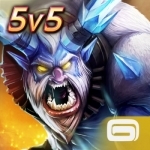
Heroes of Order & Chaos - Multiplayer Online Game
Games and Entertainment
App
THE ULTIMATE MOBA FOR MOBILE HAS JUST BEEN REVAMPED, REIMAGINED AND REINVIGORATED! Team up and...

Slingshot Racing
Games and Entertainment
App
Slingshot Racing is an original racing game developed exclusively for iOS devices. Behold a...
